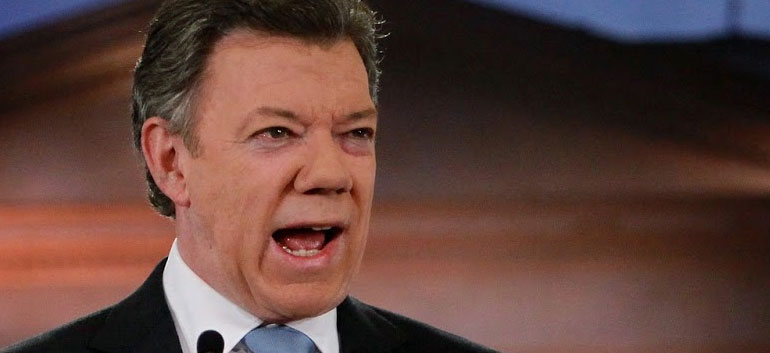A new push by Colombia’s President to apply pressure to the ongoing peace talks with rebel group FARC is more about political posturing than military or negotiation strategy, according to an expert in the Colombian peace process.
“For both sides, really, but especially for the president, this is about politics, not war” said Camilo Gonzalez, director of the Institute of Studies for Development and Peace (Indepaz), in an interview with Colombia Reports.
In a speech delivered Wednesday, President Juan Manuel Santos called on his army’s southern command to hunt several prominent leaders of the FARC, Colombia’s largest and oldest rebel group, and announced the start of the “Sword of Honor II” military initiative, which will create two joint-task forces, two Special Forces battalions, and train an additional 15,000 police units nationwide.
MORE: Santos to send 50,000 troops after FARC
November 18 deadline
The show of force on the part of the president coincided with a recent shift in rhetoric regarding the peace talks being held in Havana, Cuba. After meeting with congressional members of his U Party caucus, Santos declared a new November 18 deadline for an agreement on the second talking point in the negotiation schedule: political participation.
MORE: Santos calls on FARC to accelerate peace talks
For the past several weeks, the president has been publicly stressing the need for faster progress in the peace talks, but Wednesday’s announcement was the first time he had set a new deadline since indicating that the previous timeframe could be surpassed.
Originally, Santos was hoping to conclude peace talks within a year, but so far there has only been agreement on the first point of the five-point agenda. The president wants the second point to be decided upon prior to the November 18 one-year anniversary of the talks, despite the FARC’s consistent objections to any set time limitations.
MORE: ‘Modest achievements’ so far in peace talks: FARC
“No single offensive is going to make a difference”
The president’s new strategy is perceived by some analysts as a response to a series of attacks on military personnel and infrastructure targets that the government has attributed to the FARC.
MORE: ‘FARC’ detonates bus in northern Colombia, 8 injured
MORE: 4 soldiers die in eastern Colombia combat operations against FARC
MORE: Attack on natural gas pipeline part of possible guerrilla offensive
But according to Gonzalez, the political considerations are more important than any military tactics.
When negotiations began, he explained, “a ceasefire was never established, so periodic confrontations are to be expected. If 50 years of conflict hasn’t resolved the issue on a military front, however, no single offensive is going to make a difference, and both sides know that. The FARC has to continue to show that it is capable of striking the government, but the government, right now, has to deal with the politics.”
With national elections scheduled for next March, he said, “the issue of the peace talks is going to be dragged into the political discussion, and the political aspect is going to become more and more of a factor for the government.”
Indeed, the announcement of Santos’ new deadline came after a strategy session with U Party representatives, in which the president reportedly discussed a series of political strategy options for the peace talks heading into next March, including the possibility of suspending negotiations altogether until after the election.
Criticism from Uribe
Santos has come under fire for what some perceive to be weakness in his dealings with the rebels, particularly from former president Alvaro Uribe and candidates from his Uribe Center Democratic party.
During the same speech in which he announced the “Sword of Honor II campaign,” Santos seemed to address the criticism, saying that “if the dialogues [with the FARC] fail, I hope no one can accuse me of ceding territorial or military advantages in even a centimeter of Colombian territory.”
In response to the government’s new deadline and military stance, FARC “chancellor” Rodriguez Ganda said that the issues being discussed are “too complicated” for a quick, simple resolution, adding that “peace talks are not a soccer game that finishes in 90 minutes.”
Gonzalez had a more nuanced take on the recent advancements.
“In the short term,” he said, “moves like this from either side will have no effect on the negotiations, which have to proceed in their own time regardless. But in the long term, external escalation will only serve to reinforce the strongest positions on either side. It only makes peace more difficult.”
Sources
- Interview with Camilo Gonzalez
- Presidential press release
- Es ‘desafortunado’ la orden de Santos de mantener ofensiva militar: Farc (El Espectador)
- Segun analistas, Santos da mensaje a FARC de no estar debilitando (El Tiempo)
- Santos activo commando para perseguir cabecillas de las FARC (El Tiempo)


